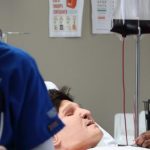Nurses are an essential part of the healthcare system, and they handle plenty of responsibilities. From taking blood samples to assisting in surgeries, they keep the functioning of the system flowing smoothly. With each passing year, the demand for healthcare professionals has only increased.
Taking up a career in nursing can be very satisfying for those who have a calling. Besides, studying nursing and having a license also opens up plenty of career opportunities.
Anyone can become a nurse if they possess the right degree and certification. However, it is a challenging course with long hours of study and practical tests. The career is even more difficult because they have so many responsibilities.
If people join nursing only because they need a job, they might not finish the course. Even if they can complete the course, the job can be very stressful, and they might find it hard to cope.
It is therefore essential for interested individuals to know some facts about nursing.
Who can become a nurse?
Qualified candidates who hold a certificate in ADN (Associate Degree in Nursing) or BSN (Bachelor of Science in Nursing) can work as nurses. They also have to clear the NCLEX-RN to get a license before starting a career.
Besides the basic qualifications, candidates can also study different courses to rise in the ranks fast and earn better.
How to get an RN (Registered Nurse) license?
The general criteria for becoming a registered nurse are similar in all the states. However, particular requirements may differ from state to state. Here are the following steps that can lead to obtaining an RN license.
Fulfill Norms to Study ADN or BSN
Students require fulfilling some prerequisites whether they plan to take AND or BSN course. Anatomy, physiology, biology and psychology are standard subjects that intending candidates should have as prerequisites for pursuing a course. Most nursing schools and colleges also require students to have at least a “C” grade in those subjects.
Get an ADN or BSN Degree
The quickest way to become a registered nurse is to get an ADN degree. It is a two-year course that teaches the fundamentals of nursing.
A BSN course lasts four years, and the subjects include in-depth lessons in clinical nursing, leadership training and interpersonal communication.
You can choose either course according to preference, convenience and eligibility criteria. Students can take more courses in time once they have a job.
Get Thorough the NCLEX-RN Exam
Nursing students can apply for a license six months before graduation. Next, they should register for the NCLEX-RN and sit for the exam. The test lasts about six hours, and they have to answer seventy-five questions via the computer.
Seek a Job
Students should start looking for jobs before graduating. Being proactive in your job search will impress future employers while you are in clinical rotations.
Obtain Board Certification
Being board certified will enable RNs to become more recognized in their jobs. Besides, it will also help to land better jobs with higher pay. Registered nurses need at least two-year clinical experience in a particular category and clear an exam.
Duties and Responsibilities of Registered Nurses
As mentioned earlier, nurses have endless roles and duties to handle every day. Many places require their services such as:
- Home healthcare
- Clinics
- Hospitals
- Schools
- Doctors’ offices
- Senior living centers
- Pharmacies
- Military
- Psychiatric centers
- Care homes
- Mobile clinics, Helicopters/Ambulance
Nurses work in different departments in those places. Some of the usual but important responsibilities of nurses include the following.
Examine Patients’ Physical Condition
Nurses are capable of conducting a complete physical exam of patients assigned to them. They take temperature, assess respiratory function, pulse, heartbeat, movement of limbs, etc.
Obtain Entire Medical Histories of Patients
When going for treatment, patients must provide their healthcare details. Nurses often take up the responsibility to note down vital information. The details enable the medical staff to provide essential treatment and care to patients.
Spend Time With Patients and Understand Their Physical and Emotional Needs
It can be quite challenging to stay calm when being ill. Patients can become quite disoriented, stressed out and sad. During these times, nurses remain with patients and listen to their problems and try to analyze them.
Offer Comfort and Healthcare Tips to Patients
Family members and loved ones can’t be there with the patients 24×7. So, nurses make sure to stay close by and give counseling to patients in need. At the same time, they also provide tips and advice on matters related to healthcare.
Organize and Manage Care With Specialists and Other Healthcare Workers
While nurses can do plenty of things, it also becomes necessary to coordinate care along with doctors and other medical staff. When they do that, taking care of patients and running a facility becomes much smoother and more manageable.
Gather and Learn Information Regarding Latest Techniques and Options in Healthcare
The advancement in medical technology is doing wonders and helping patients. It is also enabling healthcare workers to take care of their patients in a better way. So, nurses also try to stay up to date with any new healthcare options and developments in the field. With the proper knowledge at hand, they can use the latest and better options whenever needed.
Conduct Health-Related Tests
Besides examining the physical condition and offering comfort, nurses also perform some tests. They draw blood, take swabs, and check the temperature and vital signs.
What Are The Different Types of Nurses?
As mentioned earlier, nurses work in different departments. While several categories don’t require extra degrees and qualifications, some of them do. Here is a list of various types of nurses, along with the necessary qualifications.
- Clinical Nurse Specialist requires a Master’s degree and works in different categories in advanced settings.
- Labor and Delivery Nurse works in the delivery room to help with the birth of babies. A professional should hold an associate degree.
- Nurse Anesthetist administers anesthesia before, during, and after surgical procedure. A professional needs a bachelor’s degree and a certificate in the specialty.
- Neonatal Nurse is someone who works with sick infants and must have a bachelor’s degree.
- Nurse Educator is a professional who provides advice and teaches intending nurses in their path towards becoming a nurse. Only a master’s degree holder can become a nurse educator.
Other important nurses include School Nurse, Ambulatory Nurse, Pediatric Nurse, NICU Nurse, Travel Nurse, and Family Nurse Practitioner.
As you can see, there is a need for nurses in almost every place. They are therefore vital to the system. As there is such high demand for nurses, people intending to take nursing as a career can easily find work. They can have an amazing career and also help society in general.
 Nursing Trends
Nursing Trends






